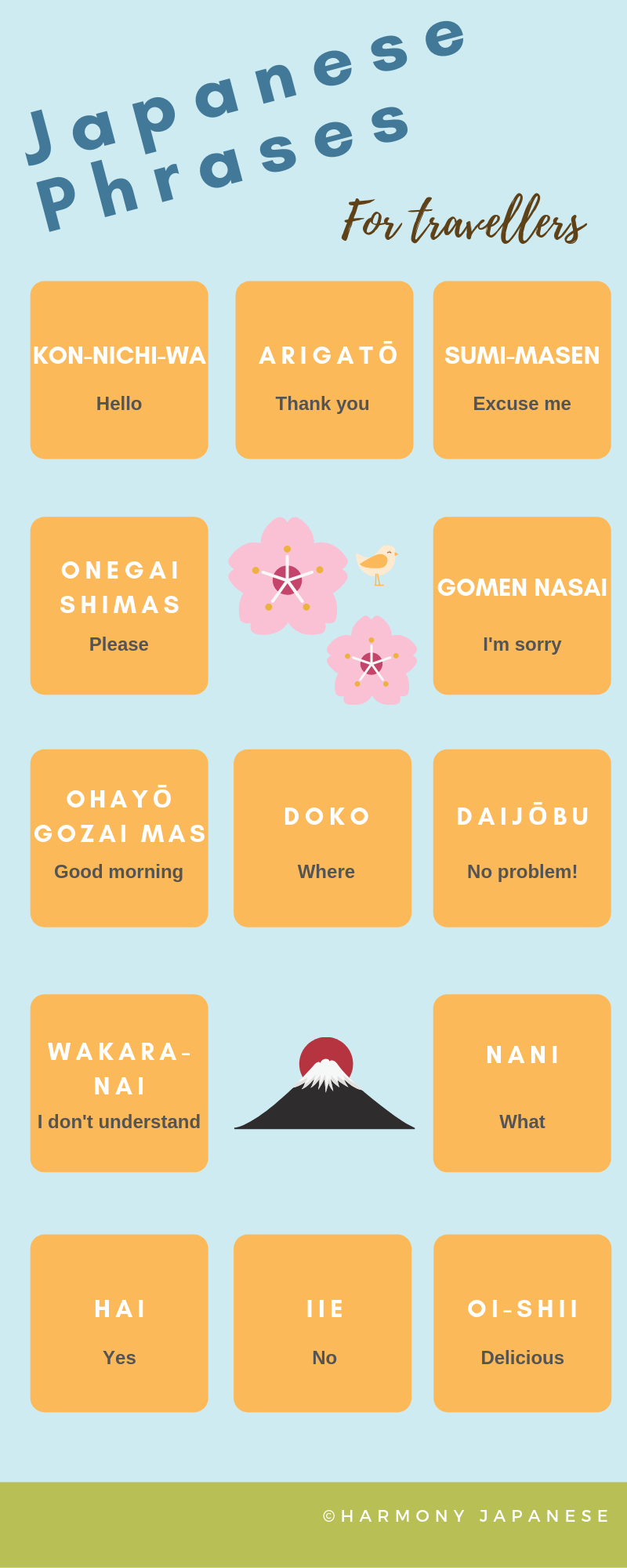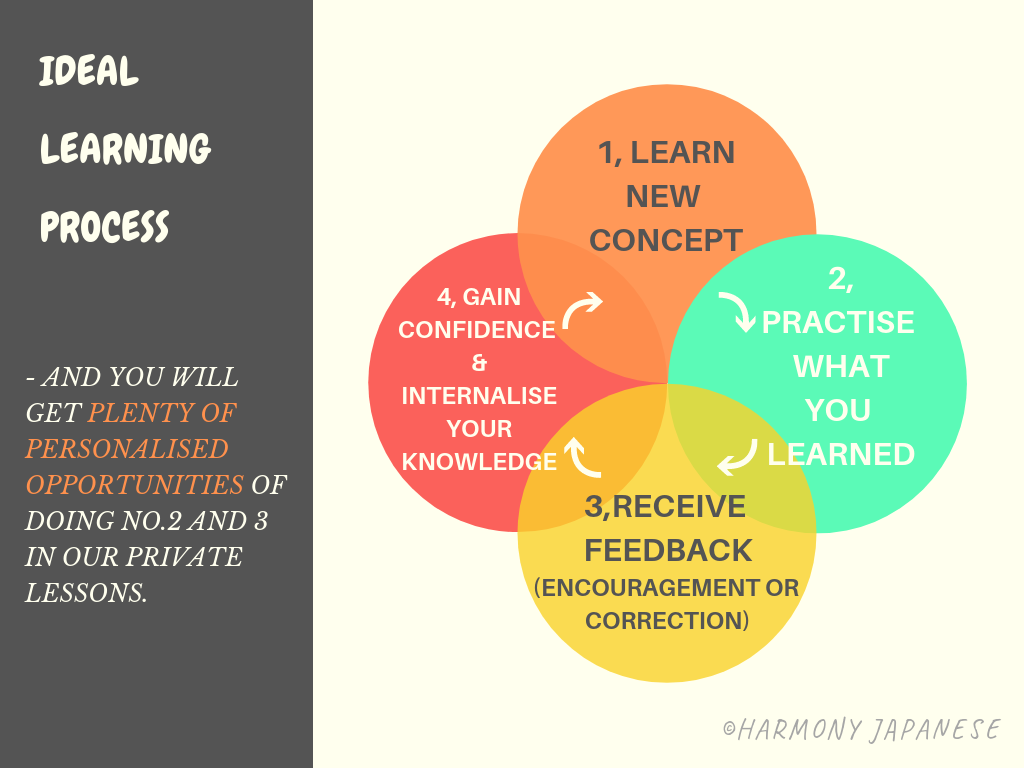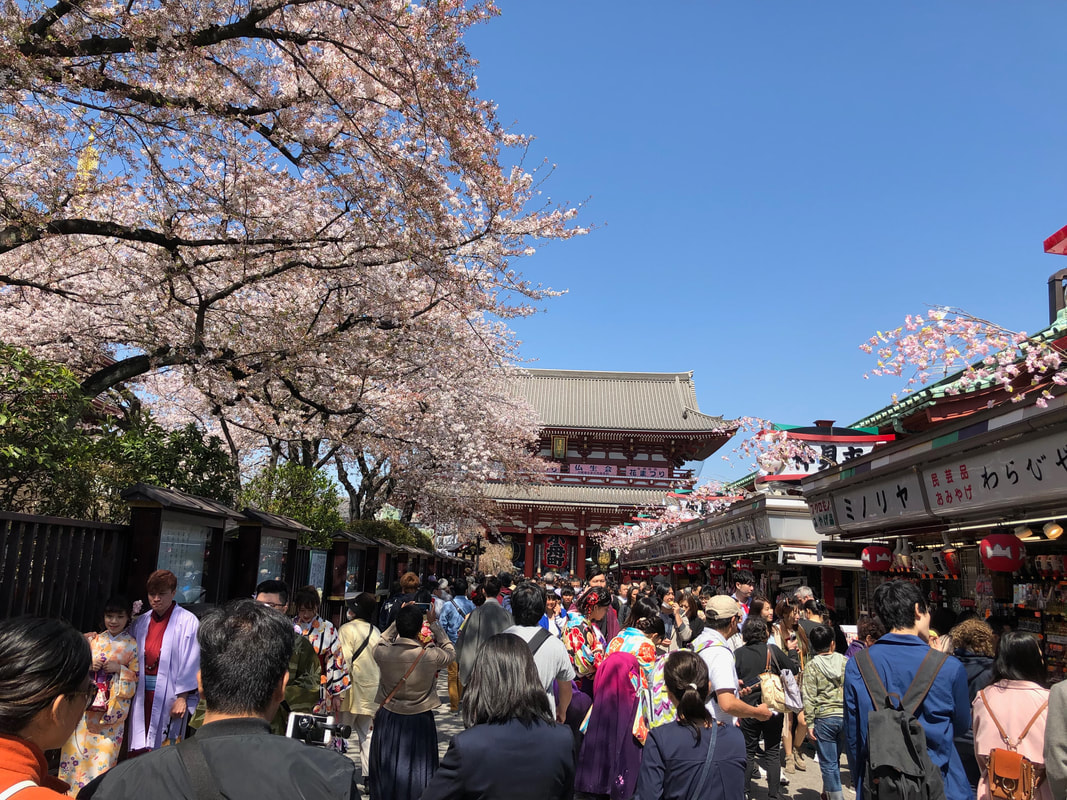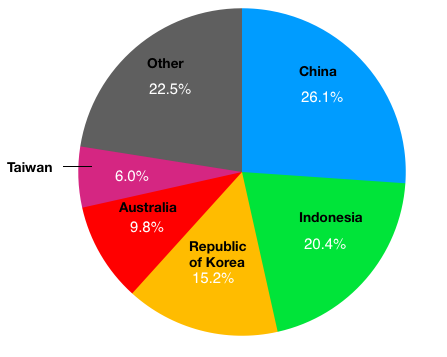|
I've created a Japanese phrase sheet for travellers.
I hope it helps you to have a great time in Japan! Openers are used as signals that you are going to say something.
Fillers fill up the gaps in your speech, i.e. “um", “uh”, and “like” etc in English. They often have no concrete meaning, yet greatly help you sound more natural and fluent if you add them in your speech. Especially when you first learn Japanese you need to fill the silence while you search for vocabulary, and fillers are an excellent way to do so without creating an awkward pause. So let’s start integrating fillers into your speech so you will sound less like a textbook and sound more approachable and conversational! By the way, in Japanese some phrases are almost exclusively said by men, and some are usually said by women. But all the following phrases are gender neutral. Easy! Basic - Level 1 Eeto (えーと) Um…, Let’s see…, (When you are searching for a word) Ano (あの or あのー) Um… (➀When you are searching for a word ➁When you approach someone and try to get their attention) Sou (desu ka) (そう(ですか)) with a rising intonation Is that so? Really? *More casual without desu ka Sou (desu ka) (そう(ですか)) with a flat intonation I see. Sou desu ne (そうですね) ➀Yes, I agree. ➁Hm, Well.. (when you're pondering something someone said) Warming Up - Level 2 E (え with a rising intonation) What? Huh? Heee * "He" as in "Helen" (へぇー). Mildly impressed, surprised, interested Jaa (じゃあ) If that’s the case, Then Naru-hodo (なるほど) That makes sense. Hontou (ほんとう) or Hontou ni (ほんとうに) Really? Are *A-re, "Re" as in " Recreation"(あれ) Oh? (When you notice something unexpected) Ohhh(おー) Wow (Quite impressed.) Yatta (やった) Yay! Mochiron (もちろん) Of course Hope this helps. More expressions and their usage are closely covered in our private lessons :)
How did you first learn your mother tongue? Did you sing songs or did you play games? It's similar in Japan. Here is a video clip of a Japanese song for kids to remember everyday greetings. (It can be fun for adults too!) When I was a child there was a very popular kids TV show in Japan called "Hirake Ponkikki" and this song was from that show. I remember as a kid I listened to the song as well as many others from the show as my parents bought me a cassette tape set (Geez, CASSETTE TAPE!). Surprisingly I still can sing this song off by heart, so I hope this song makes Japanese greetings stuck in your head! List of greetings appear in the song Ohayoo - Good morning (casual) Oyasumi - Good night (casual) Konnichiwa - Hello Konbanwa -Good Evening Itte kimasu -I'm off Itte rasshai -See you later (when you see someone off) Tadaima - I'm back Okaeri nasai -Welcome back Itadaki masu -I humbly receive (bon appetit) Gochisoo sama - I appreciate the meal I just had (literally: It was a feast) Arigatoo - Thank you Sayoonara - Good bye Mata ashita - See you tomorrow (Although it's not a greeting....) Kinoo no yumeno tsuzuki wo mini ikoo -Let's go to sleep to continue the dream from yesterday (last night) Can you guess which country has the most Japanese learners? The answer is China, and maybe this didn’t surprise you, but did you know that out of all Western countries, Australia has the most Japanese learners? Intriguing, isn't it? By the way, more than 97% of learners in Australia are primary school or secondary school students. According to SURVEY REPORT ON JAPANESE-LANGUAGE EDUCATION ABROAD 2015 by Japan Foundation Furthermore, by the number of learners per 100,000 population, Australia topped all countries with 1,419 people! Followed by Korea at 1,106 people, and Palau's 1,005 at people. No wonder I often come across Australians who know some Japanese!
Did you know that you are already using some Japanese words without knowing?
Compared to other foreign languages like French or Italian, the number of Japanese words in English is limited, but there certainly are some Japanese words that have been well adopted into English. Here are some examples..... Tsunami : Hazardous coastal wave(s) usually caused by a big earthquake. In Japanese the first letter "T" is prominently pronounced unlike in English. Emoji : Those picture icons people use in their text messages or emails😄 "E (pronounced "E" as in "End") means "picture/drawing" in Japanese and "Moji" means "letter/character". Karaoke : Singing over pre-recorded back music. "Kara" means "empty (as there is no singing recorded in the back music)" and "Oke (pronounced "Ke" as in "Keg)"" came from the English word "orchestra". So it's actually a combination of Japanese and English! Midori : You might know this if you are a drinker! It's a bright green-coloured liqueur with a sweet taste. The name is self-explanatory as it means green in Japanese. It's made by Suntory, a Japanese brewing and distilling manufacturer. Futon : A folding sofa-bed without springs. However, even though this word originated in Japanese, in English it's meaning has changed quite a bit. In Japan Futon refers to either the mattress you lay down and the doona covering your body, or a set of both. Kimono : Traditional Japanese clothes. Nowadays Japanese people wear kimono only at certain occasions such as coming-of-age (20 years old) day celebration, wedding, funeral etc. "Ki" is a part of a word "ki-ru" which means "To wear" and "Mono" means "thing". Tycoon : To be honest, until recently I personally didn't know this word originated in Japan! It derives from the Japanese word "Tai kun" which literally means "great lord". I guess we don't have lords in Japan anymore hence the word has lost its place in the society and the word is becoming obsolete. Wagyu : A breed of beef cattle native to Japan. "Wa" stands for "Japanese/Domestic" and "Gyu" came from the word "Gyu-niku" which means "beef". and the list goes on and on especially if you include names of food, drink, and sport (judo, karate...) etc! |



